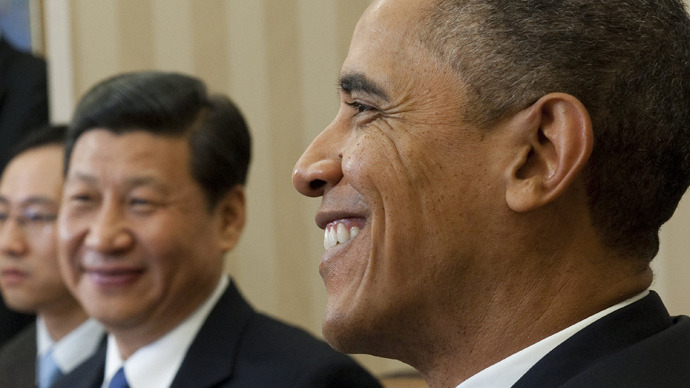Cyber war is US ‘red herring’ to put pressure on China

The US-China cyber battle is just a distraction designed by the Obama Administration to pressure China at a time when the Washington is implementing its “Pivot to Asia” foreign policy initiative, geopolitical analyst William Engdahl told RT.
The California summit meeting between American President Barack
Obama and his Chinese counterpart Xi Jinping comes as the world’s
two largest economies clash over a range of divisive issues -
including accusations that China has launched a cyber war against
the United States.
The meeting follows reports of Chinese hackers resuming their attacks against targets in the US and the most recent the revelations that the American NSA's PRISM program allegedly spied on millions of emails.
RT:The US has been very active in the field of cyber espionage lately, so why get so touchy when somebody uses its own methods against it?
William Engdahl: The US is probably the number one cyber
warfare force on the planet right now. China is probably playing
a defensive game.
I think that’s a red herring issue right now designed by
Washington, by the Obama administration to put pressure on China
at a time when the US is doing just that with the so-called Asia
pivot. Which really is a China pivot that Obama announced in
Australia back in 2011 to re-direct the American military force
posture towards Japan with the missile defense which is [aimed]
directly against China, towards the supporting of Japan in the
Diaoyu Islands dispute which are in the South China sea, which is
very critical for China’s access to potentially vast mineral
resources as well as its military sovereignty.
So, I think this cyber-warfare is really a red herring in this
whole dialogue.
RT:China is planning to strengthen its military with so-called 'digitized' troops - armed with intense IT capabilities. Is Beijing preparing for a storm?
WE: I think they are preparing. In fact I know they are
from my recent time in Beijing with leading people there. They
read the writing on the wall; they read that the US is pressuring
them through their support of the Arab Spring uprisings in Libya,
in Egypt, in Tunisia and now putting all their efforts into
trying to topple the regime in Syria and direct it toward Iran,
which are the links to the secure oil supply lines for the
Chinese economy. So, they are very well aware.
I think what’s significant about this Xi Jinping visit to Obama
is the sequence of it. He became president in early spring this
year and his first visit as a head of state was to Russia’s
Putin.
The second visit was to South Africa for the BRICS summit and several African countries – Tunisia and Congo. Then, he comes to the Caribbean, Mexico and Costa Rica among them before he meets with the President of the United States. Some 10-15 years ago that would never have happened.
More cyberspace vigilantes to come?
With the latest NSA scandal it became even clearer that the US is controlling most of cyberspace “that America is the vigilante in cyberspace,” but will eventually lose its dominance, investigative journalist and author Pepe Escobar told RT
“A year and a half ago they started talking about the cyber-war from China but before that the US already launched a horrendously vicious attack via the Styxnet virus against Iran,” Escobar said. “So if we are going to have cyber-wars from now on it’s not going to come only from the US or from China. It is going to come from the European Union as well sooner or later. It’s going to come from Iran and from other developing countries out there as well.”
“If countries see that they are having extreme problems –
trade problems, financial problems – they could counter-attack on
cyberspace,” he said.
Escobar believes that Barack Obama is going to hand over to his Chinese counterpart a “very detailed dossier” about all the alleged cyber-attacks coming from China and “how much this whole thing cost in terms of US business.”
“The thing is, how is president Xi Jinping going to act upon
this dossier,” Escobar says. “Is he going to
get somebody in China – the usual two or three scapegoats – so he
can satisfy Obama, person-to-person of course; it's not going to
do anything; or in fact these affiliated hackers which in fact
can have a military connection – or not – in China are going to
keep on improving what they are doing."
The statements, views and opinions expressed in this column are solely those of the author and do not necessarily represent those of RT.












